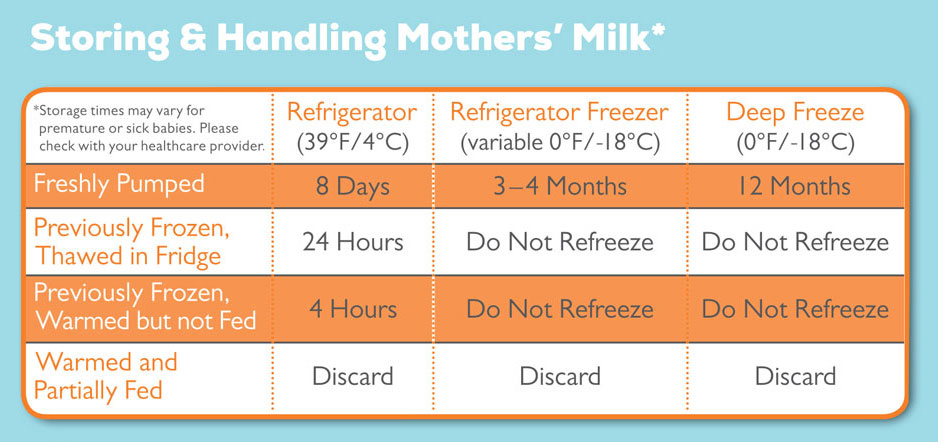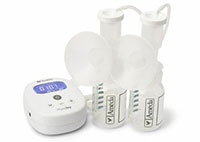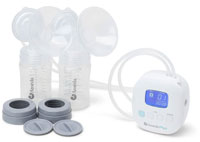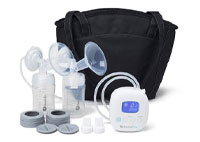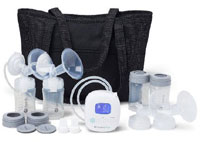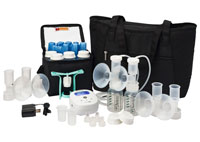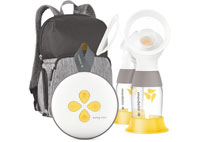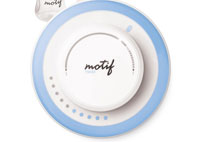Breast Pumps Brands We Offer:

Breast Pumps
They are available now at Xceed Medical. We offer hospital-strength breast pumps, breast milk storage, breast care, and breastfeeding products to serve moms in every stage of new motherhood, and we ensure that they feel empowered and prepared for breastfeeding.
We want to help care for mothers and their little ones.
Xceed Medical offers the perfect combination of advanced technology and the time-proven benefits of Breast Pumps.
Diet & Breast-Feeding
No, there aren’t any foods you must eat or avoid while breastfeeding. In most cases, no need to steer clear of foods like chocolate, onions, garlic, broccoli, cabbage, or spicy foods. The key is to eat various healthy foods and not overeat one thing.
No, there aren’t any foods you must eat or avoid while breastfeeding. In most cases, no need to steer clear of foods like chocolate, onions, garlic, broccoli, cabbage, or spicy foods.
The key is to eat various healthy foods and not overeat one thing. Sometimes something you eat may cause your baby to be a little fussy, but remember that most babies have precise periods throughout the day for various reasons, such as needing to burp or having their dirty diaper changed.
If you have a family history of food allergies or your baby is very fussy, limiting or eliminating certain foods can help. Food types commonly cause your baby to be picky, including dairy or milk products, eggs, or nuts.
If you stop a particular food, do so for a few weeks, then try eating it again and see if the fussiness returns. If your baby has dry, flaky skin, a rash, a stuffy or runny nose, wheezing, or you see bloody stool in his diaper, contact your baby’s health care provider.
No, your body stores fat during pregnancy that your body uses as fuel to make breast milk. When your body needs additional calories, listen to your hunger cues, and eat healthy foods when you are hungry. Any diet should include at least 1800 calories daily. And, if you are physically active or very tall, you may need more, at least 2000-2400 calories daily.
Most women lose their pregnancy weight when their baby is about six months old if they are exclusively or almost exclusively breastfeeding. If you restrict your calories too soon, your body will continue to make high-quality milk at the expense of your health.
You could become malnourished, leading to a lack of energy and a poor immune system, so that you can get sick more often. Your milk supply may also decrease if you are not eating at least 1800 calories daily.
Breastfeeding, eating healthy, low-fat, nutrient-dense foods, and exercising is the best way to ensure a slow, steady loss of pregnancy weight.
While breastfeeding, small amounts of artificial sweeteners, saccharin, aspartame, or sucralose should be safe. You should use no more than 2-4 servings daily.
Ensure you get enough protein in your diet by eating foods such as seeds, nuts, beans, fortified cereals, and soy products. You might need to take a supplement containing B12, iron, vitamin D, and zinc from animal proteins (meat, fish, eggs, or milk products). Talk to your health care provider to see what they recommend.
There is little evidence that any foods or herbs we take help to increase milk supply. However, it may be enough that we believe they work that our bodies respond to them. Substances that help increase milk supply are called galactogogues. They work by increasing the hormone, prolactin, which helps your body make breast milk.
The best way to develop a good milk supply is to drain the breasts frequently by breastfeeding or pumping. If you have concerns that your milk production is low, talk to your lactation consultant or health care provider who can inform you about some herbal and prescription galactogogues that have been studied.
No, drink to thirst. Usually about 6-8 servings of fluid a day is enough. To make it easy, have a healthy beverage at your side when you breastfeed. Water, low-fat or nonfat milk or 100% juice are good options.
As with all parts of your diet, think moderation. Too much caffeine can cause your baby to be fussy or wakeful. One or two cups of coffee (or other caffeinated drinks such as teas or colas) are not likely
to cause a reaction.
It is best not to since alcohol does pass into the breast milk. Even small amounts daily can affect your baby’s motor development and ability to care for your baby.
Drinking small amounts of alcohol (4 oz. of wine, 12 oz. of beer, or one oz. of vodka, rum, gin, or whiskey) occasionally (1-2 drinks a week) may be okay.
Try not to breastfeed for at least 2-3 hours after you drink. As alcohol levels in your body drop, so do alcohol levels in your breast milk, so there is no need to pump and dump if you follow these guidelines.
Breastfeeding
Breastfeeding provides increased health benefits for babies and their mothers. The health benefits of breast milk are due to the species-specific live cells, antibodies and hormones. These are presentt in human milk but lacking in formula.
Full term infants are less likely to develop:
- Colds, pneumonia & astthma
- Ear infections
- Diarrhea
- Skin conditions like eczema
- Type 1 and 2 diabetes
- Leukemia
- Obesity
- Sudden Infant Death Syndrome (SIDS)
Mothers are less likely to develop:
- Breast or ovarian cancer
- Type 2 diabetes
- Postpartum depression
Learn about breastfeeding by spending time with other mothers who breastfeed. Go to a local breastfeeding support group before your baby is born. This is a great way to learn about breastfeeding and meet other breastfeeding mothers.
Contact your local hospital to find out what is available in your area. You can also attend a breastfeeding class and read a book about breastfeeding to get you prepared.
Yes. It depends on how early your baby is born whether they will breastfeed right away or not. If your baby is born early, you may need to pump to build up a full milk supply. More information can be found in the Breastfeeding the Preterm Baby Q&A.
No, it shouldn’t hurt. At first, it can feel a little uncomfortable in the first minute or so after your baby latches. After, you should feel a tugging feeling when your baby sucks. If you feel pain throughout the breastfeeding session, get help from a lactation consultant to learn how to latch your baby on right.
The first several weeks, your baby will breastfeed 8-12x every 24 hours. Feed your baby when she is hungry, she will give you signs called hunger cues. Over time, she will breastfeed less often. More information can be found in the Making Milk For Your Baby Q&A.
No. Breat size is determined by the amount of fatty tissue they contain. Your breast size does not affect your ability to make milk. Both small and large breasted women can make enough milk for their baby’s needs.
Easy. What goes in must come out! You will know how much your baby is getting by how often he has wet and dirty diapers. Healthy weight gain is also a good sign that your baby is getting what he needs. You don’t need to know exactly how much your baby takes. You only need to know that your baby is thriving. This can simplify life with a newborn.
Yes. Some breastfeeding is always better than none. When you go back to work you have many choices:
- Full breastfeeding: Going to your baby or having your baby brought to you to breastfeed
- Pumping and breastfeeding: Giving pumped milk to your baby when you are apart and breastfeeding when you are together
- Pumping, giving formula and breastfeeding
You don’t have to if you don’t want to. Many places have private nursing lounges. You may even find that with a little practice and a blanket to cover up, you can breastfeed anywhere without anyone noticing.
There aren’t any foods you must avoid; the key is to eat various healthy foods and not overeat one thing.
Drink to thirst. Healthy beverages without caffeine are better, like water, non-fat milk, or 100% juice. One or two caffeinated drinks a day will not likely cause your baby to be fussy or wakeful. It is better not to drink alcohol, and a small glass of beer or wine for a special occasion is usually not a problem.
The first weeks after having a baby can be exciting and overwhelming – you are learning a lot, and so is your partner. Your partner can help by learning to recognize your baby’s hunger cues. Helping you get comfortable breastfeeding. Keeping you hydrated and nourished after breastfeeding, help get your baby comfortable, and praise your efforts. Work together – this is just the beginning of your days as a family.
Other Helpful Resources
